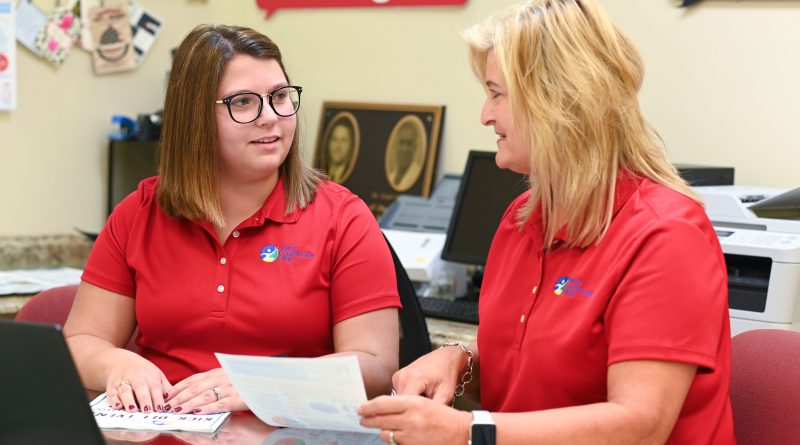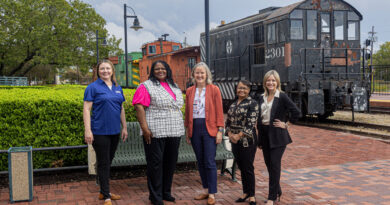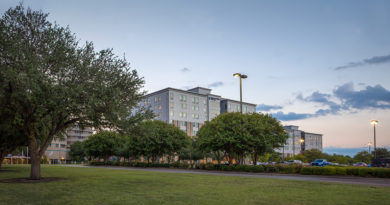Social Worker Helps Temple Community Clinic Better Serve Its Clients
By Janice Gibbs | Photography by Nan Dickson
The Temple Community Clinic added a social worker to its staff this year — an initiative that helps the clinic better serve its clients.
Open for 27 years, the clinic’s population is made up of the working poor with eligibility determined by household income. Serving that population in an ever-changing healthcare environment is a challenge. The clinic, with guidance from its board, has made adjustments, says Sherri Woytek, executive director.
Community health is the goal, but getting there can be difficult, particularly with a customer base that has needs going beyond giving a flu shot or getting a prescription for high blood pressure.
Adding a social worker, Hollie Spinn, to the clinic’s staff already has resulted in some tangible successes by uncovering specific needs, not necessarily associated with healthcare of the individual, says Woytek.
“We’re not going to offer shelter or a food pantry, but we pride ourselves in understanding what resources the community has and how to connect those to our clients,” she says. “That truly defines what a case manager or social worker does. That’s where our clinic has stepped out of our comfort zone. It’s where we belong.”
The clinic recognized the value of the social worker when it has had social work interns.
“You have to find the right person because they have to have a passion for the community,” Woytek says. “We found that with Hollie. We were lucky.”
Most groups would seek grants to fund the position before filling it, but the board decided it had the right person and it needed to take a chance. “We’ve seen the value of having the case manager and its benefit to our patients and funding is coming,” Woytek says.
The social worker makes the connections between the people who have access to resources and the patient. It’s less stressful for the individual requiring assistance to know the next person they meet in the process knows their story and is expecting them.
If someone hands over a bunch of documents to be signed to a person seeking help, the individual in need may not follow through because they are overwhelmed and afraid. Every group has eligibility criteria and when you have someone working with the individual to make those determinations it’s an education process and builds trust.
Spinn did a nine-month internship at the clinic prior to being hired in May. She will be able have social work interns working under her guidance within two years, providing additional support to clinic clients.
“We have a Texas A&M social work intern at the clinic now and will continue that so we can expand our services further,” Woytek says.
Spinn recently completed a process she started with a clinic patient in May. The individual came in with mental health concerns. With Spinn’s help the patient was connected with a community partner that handles counseling referrals. The individual had a number of counseling sessions and checked in with Spinn to let her know the sessions had been completed and would get in touch if she needs further assistance.
“That’s the point you want to get to in social work,” Spinn says. “The patient can self-sustain.”
Woytek took a wider view of the experience. “That patient is more likely to come back here for other needs if she has them, rather than heading to the emergency room, or go without care. They now know there are available resources and they have a clinical home to return to.”
Every new patient sees Spinn or the social work intern to do a needs assessment, which collects more information than any eligibility form could provide. The patient may be coming in for an ear ache, but there could be other issues.
The social worker is looking at the social determinants of health that include: food security, living conditions, neighborhood and physical environments, social support network, access to transportation and other details.
“If there is something else other than healthcare that we can’t provide, we’re referring that out to someone who can,” Spinn says.
Spinn is networking with individuals at the agencies that are used as referrals. She has accompanied Woytek to different meetings and met people along the way.
There also are connections that can happen by chance. Woytek and Spinn were at Temple College looking at a venue for the clinic’s Living Well in Bell series. They went to see another space on campus in the Arnold Student Union Building. There the two happened to meet TC fine arts division director Brent Colwell, who is shepherding the development of the school’s Circle of Support initiative.
TC’s Circle of Support and the clinic have like goals, particularly finding solutions for the vulnerable members of the populations they serve.
Woytek told Spinn it’s those chance meetings where you find the people who can open doors for you and you can open up doors for them. “That’s how it works. You can’t plan those circumstances,” Woytek says. “You have to be out, you have to be present and you have to be open.”
Spinn’s actual job title is case manager and community resource manager.
“I don’t think she can be successful here in her role unless she’s constantly communicating with the community resources,” Woytek says. “Those resources are ever changing.”
Spinn recently helped a clinic patient with an out-of-state driver’s license connect with Feed My Sheep where the case managers know exactly what’s needed to get a Texas license. “Once you connect the patient with the necessary resource it’s up to the patient to follow through,” Woytek says. “You provide them with the options.”
Spinn said she sometimes makes the initial call to another agency with the patient in the room, so they feel confident it’s not going to be a dead end.
“They feel empowered,” Woytek says.
Every day at the clinic is different, the same with patients, Spinn says. “It’s a hard job, but it’s a good fit for me.”
Spinn developed a chronic illness that took about a year to diagnose. That experience pushed her toward social work. “I’d never consider social work because I always associated it with CPS (Child Protection Services),” she says.
A friend told her there were other options, and encouraged her to do some research. Two months later, Spinn was in a social work master’s program.
Spinn describes her role as ”middle man” between the client and other services, letting them know what’s available, “whether it’s to have their vision checked, have an odd mole looked at or is unrelated to health. Many don’t realize they can get additional services.”
Spinn often talks to the physicians on behalf of the patients if they are afraid of doctors.
Last year, the clinic saved the community more than $1 million by reducing visits to the emergency room, hospital stays and prescription assistance.
The clinic’s patients, new and existing, take a survey using an electronic tablet when they come for an appointment. The survey asks whether the individual would have gone to an emergency room or gone without care if they didn’t have access to the community clinic, along with other information.
The clinic is at 1905 Curtis B. Elliot Drive, Temple. It is open 8 a.m. to 4 p.m. Monday through Thursday. Clinics are held Tuesday through Thursday. Call 254-771-3324.
Living Well in Bell kickoff is Oct. 12
Living Well in Bell, a new series of monthly events, will provide health, financial and other information to the community. The first two sessions will be at 10:30 a.m. and 6 p.m. Oct. 12 at Temple College Pavilion, 1903 S. First St. It’s free and open to the public.
Dr. Patsy Sulak, Baylor Scott & White physician and founder of Living Well Aware, will be the first speaker. Sulak’s program promotes implementing and maintaining a healthy lifestyle.
Emotional and spiritual health is not adequately addressed in most health and wellness programs. Living Well Aware includes all aspects of health to include relationships, contribution, time and financial management, forgiveness, purpose, and social connections. While not promoting any specific religion or spiritual philosophy, the importance of connecting with one’s inner self, and for most, a higher power, is included. The Temple Community Clinic is supporting the monthly event, says Sherri Woytek, the clinic’s executive director.
“The Temple Community Clinic can’t pay people’s insurance and we can’t provide healthcare to everyone, but we can educate them,” Woytek says. Individuals who don’t need the information for themselves might learn something they want to pass along to others invest more in support of the community clinic.
For information, call 254-771-3324 or email LWIB@TempleCommunityClinic.org.
BODY OF CHRIST COMMUNITY CLINIC
By appointment only
Medical Clinic, 8 a.m. to noon Tuesday and 6 to 9 p.m. Thursday
2210-B Holland Rd., Belton
254-939-9500
Dental Clinic, 8 a.m. to 5 p.m. Tuesday, Wednesday, Thursday and 6 to 9 p.m. Thursday
1508 Oleta St., Belton
254-613-5052
BodyOfChristClinic.org
Eligible families are uninsured, low-income or unemployed, don’t have Medicaid, Medicare or aren’t eligible for VA services. Serves patients in east Bell County. Patients are screened for eligibility.
GREATER KILLEEN COMMUNITY CLINIC
718 N. Second St., Suite A, Killeen (inside the Killeen Arts & Activities Center)
254-618-4211
GKFClinic.org
Open Mondays and Thursdays, 8 a.m. to 7 p.m., Tuesdays and Wednesdays, 8 a.m. to 4 p.m., closed Fridays
Mondays and Thursdays walk-in acute care, check in 3:30 p.m.
Tuesdays walk-in acute care, check in 8:30 a.m.
Other services by appointment only
Open to children and adults who are low-income and uninsured. Serves patients in Killeen and surrounding communities. Services include acute and chronic care, medications, mental health by referral, limited dental care, case management and health education. The clinic refers patients to an appropriate agency for services it cannot provide.
TEMPLE COMMUNITY CLINIC
Monday through Friday 8 a.m. to 4 p.m.
1905 Curtis B. Elliott Dr., Temple
254-771-3374
TempleCommunityClinic.org
The clinic is a resource for wellness, education and health services to qualified residents of Bell County, provided at no cost. Offers chronic and acute illness, prescription assistance and specialty clinics, such as cardiology, GI, podiatry, vision, dental, women’s health, dermatology, mental health and diagnostic testing. If the clinic can’t meet a patient’s needs, they utilize a network of community resources to locate the best option for care. Community collaborations and partnerships with The United Way, City of Temple, Baylor Scott & White Health, Texas A&M Health Science, National Association of Charitable Clinics and Texas Association of Charitable Clinics provide the clinic with a progressive approach to meeting the health and wellness needs of Bell County, increasing patients’ access to care while training future providers.
FEED MY SHEEP CHILDREN’S FREE CLINIC
No appointment required
613 S. Third St., Temple, office
254-239-9863
Every third Saturday, 10 a.m. to noon
9:30 a.m. registration
FeedMySheepTemple.org
Serving uninsured or homeless children, newborn to age 18. Patients don’t have to complete a prequalification process to receive most services. Dr. Stephen Ponder, an endocrinologist at McLane Children’s Hospital, doubles as the clinic’s medical director. The clinic offers well and sick child visits, vision and dental screenings for children. Specialty doctors regularly offer their services at the clinic, including dentistry, podiatry and dermatology. Prescription assistance is available for sick children. Clinic is a mobile operation and sets up at various locations each month. Call for more information.
COVE HOUSE FREE CLINIC
806 E. Avenue D, Suite H, Copperas Cove
254-298-9865 — call and leave a message
CoveHouse.org/Need-Help/Free-Clinic/
Open Tuesdays. Patient sign-in is 5 to 6 p.m. First come, first served.
Line forms at 2:30 p.m.
1st and 3rd Thursday, by appointment only: Women’s Health, Mental Health and STD testing
3rd Thursday, by appointment only: Cardiac Health
Serves uninsured adults and children in Killeen, Copperas Cove and Lampasas — no residency requirement. Volunteer medical professionals from AdventHealth System, Family Medicine Clinic in Copperas Cove and Lampasas, Fort Hood, Baylor Scott & White Clinic in Copperas Cove and private practices staff the clinic. General medical services are available; prescriptions and assistance with labs and X-rays by referral. Clinic doesn’t offer emergency care.
MARTHA’S HEALTH CLINIC
1402 W. Avenue H, Temple
737-808-3320
Medicine.TAMHSC.edu/Student-Organization/Marthas-Clinic/index.html
Thursdays, 6 to 9 p.m.; first come, first served; line begins at 4:45 p.m.
No ID required. Staffed by Texas A&M medical students, this clinic serves the homeless and indigent population in Temple and Bell Counties. Provides basic healthcare needs, helps with referrals to Scott & White Medical Center–Temple and offers social services resources. Prospective patients can call the number listed above and the clinic will return their call with appropriate information.




